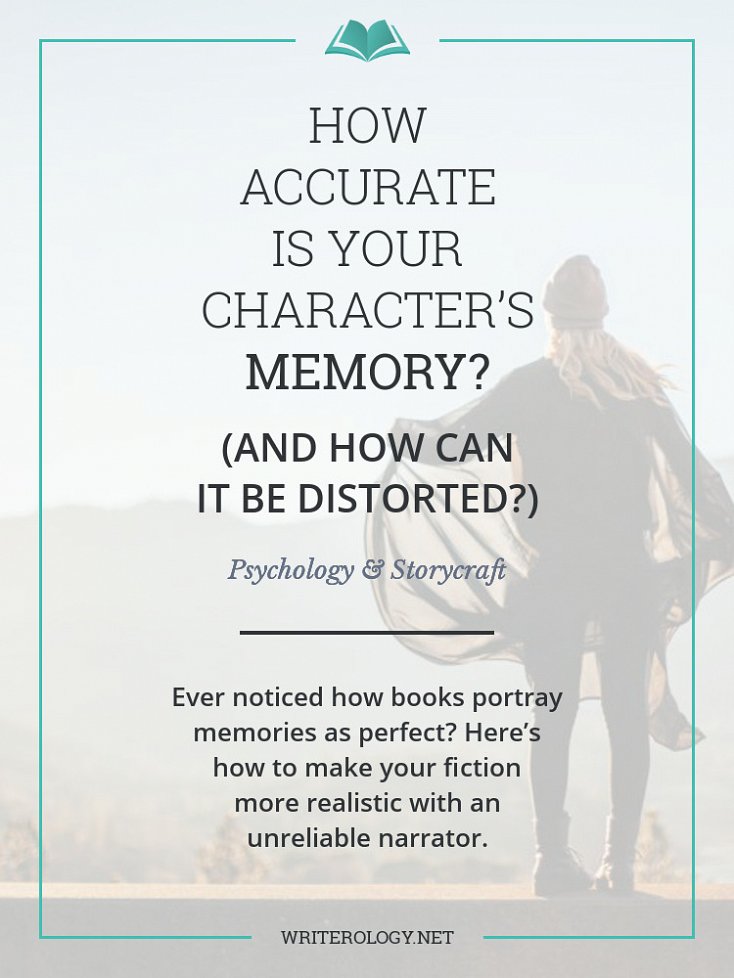How Accurate Is Your Character’s Memory—And How Can It Be Distorted?
Memories are imperfect things. Easily distorted, manipulated and lost, they make us—and our characters—prone to unreliable reporting of events.
When asked about an incident, the phrasing of the question—sometimes even the presence of a single word—can alter our memories. Why should our characters be any different?

Leading Questions
As writers, we understand the power of words. What you may not know, however, is that changing a single word in a question can have a significant impact on the answers to that question.
For example, in 1974 Loftus and Palmer had their participants watch a clip of a car accident and then asked some of them:
“About how fast were the cars going when they smashed into each other?”
When they swapped ‘smashed’ for ‘collided’, ‘bumped’, ‘contacted’ or ‘hit’ and asked other participants the question, the estimate of the cars’ speed was much lower than for ‘smashed’. Replacing just one verb altered the participants’ memories of the event.
Even seemingly unnoticeable words, like ‘the’ or ‘a’, can influence our memories. Take these two sentences:
"Did you see the man cross the street?"
“Did you see a man cross the street?”
Depending on which you’re asked, your answer, and your memory of the event, might change. ‘The’ implies the man was present and did indeed cross the street. Asking the question using this article could therefore cause you to assume there was a man crossing the street and edit that into your memory, even if there was actually no man there at all.
Emotion and Memory
It’s not surprising that our emotions can influence how well we remember something and what kind of things we remember. For example, people with a negativity bias tend to pay more attention to negative events, while those with depression are susceptible to recalling more negative information about themselves.
Sufferers of post-traumatic stress disorder (PTSD) often report intrusive flashbacks, amnesia regarding parts of the trauma, and more fragmented memories. It’s clear, then, that events with a negative emotional tone can impair our memories.
Age and Memory
The ability to remember events accurately changes over our lifespans, with the very young and old displaying poorer recall than adults. It takes the hippocampus, a part of the brain involved in laying down new memories, several years after birth to fully mature, which means children have very few, if any, memories before their fifth birthday.
Related post: Your Character’s Very First Relationship (Hint: It Affects All the Others)
Recall peaks during early adulthood, with late teens and twenties being particularly memorable years down the lane. This could be because the memory-related areas of our brains have reached optimal maturity by this age; because we’re forming our identities around this time; or because the things we’re doing are particularly new and memorable (who doesn’t do some crazy stuff during their youth?). Either way, the memories formed during early adulthood tend to stay with us for the long haul.
By old age, the ability to accurately recall information tails off, making the elderly more likely to give unreliable accounts of recent events. Not only that, Dodson and Krueger (2006) found that older adults were often much more confident in their misremembered testimonies than younger adults.
Applying Theory to Fiction
Conflict
If a character can’t report an event accurately, this can cause all kinds of problems for your protagonist... and more so if your protagonist’s the one who can’t remember!
Have a character tell an unreliable story to misdirect readers in a mystery. If you have an elderly point-of-view character, the narrator may misremember recent events, but report them to the reader and other characters with misplaced confidence. This unreliable narration could lead to a plot twist or major revelation later in the story.
If a character witnessed a traumatising event before the events of the story, her memory of this could be impaired, making for an unreliable narrator. This becomes particularly interesting when other characters recall the event differently—who is correct, if anyone?—or when the character must put aside her inaccurate memory and seek the truth.
Questioning
If a character is being questioned—by an investigator, friend or antagonist—the way they phrase a question or the words they use can influence the way the character recalls the event.
Narrative
Consider the influence of wording when writing narrative. If the presence of ‘the’ instead of ‘a’ can have such an impact on a person’s recall of an event, then this can be put to good use in directing (or misdirecting) readers.